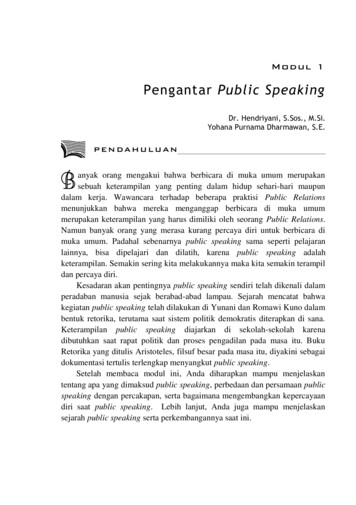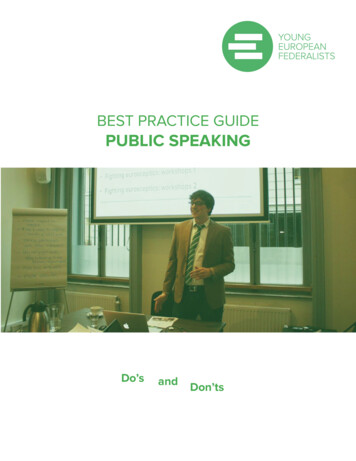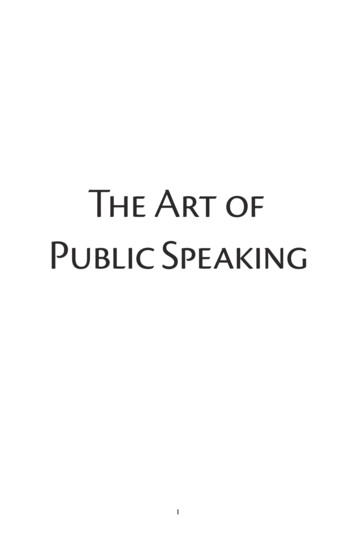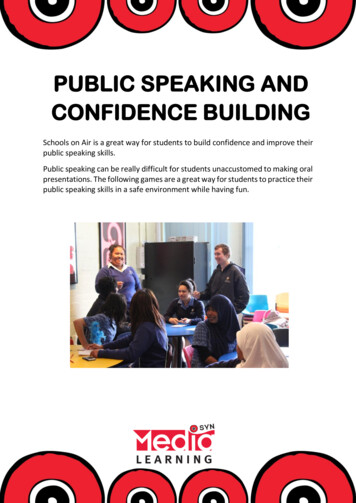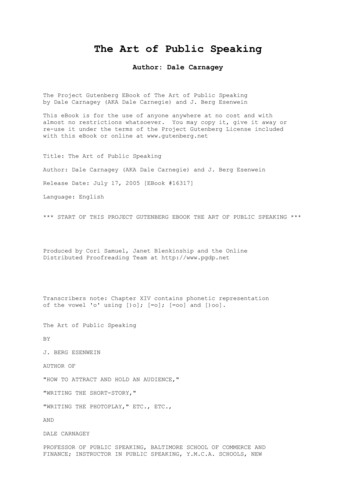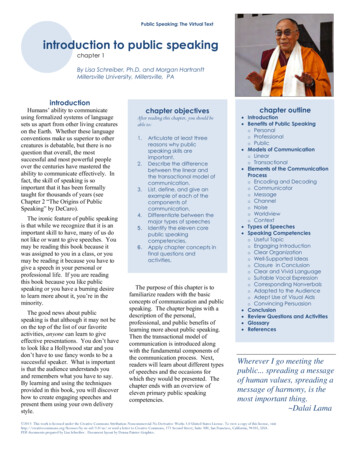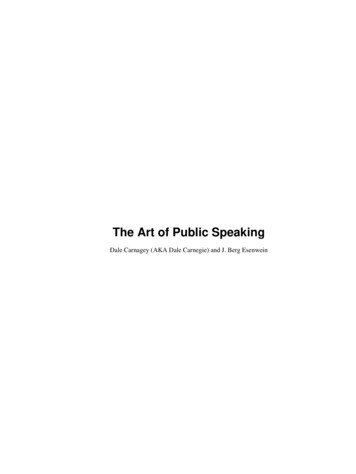
Transcription
The Art of Public SpeakingDale Carnagey (AKA Dale Carnegie) and J. Berg Esenwein
The Art of Public SpeakingTable of ContentsThe Art of Public Speaking.1Dale Carnagey (AKA Dale Carnegie) and J. Berg Esenwein.1"1 1" THE ART OF PUBLIC SPEAKING.4"1 1 1" CHAPTER I. ACQUIRING CONFIDENCE BEFORE AN AUDIENCE.4"1 1 2" CHAPTER II. THE SIN OF MONOTONY.8"1 1 3" CHAPTER III. EFFICIENCY THROUGH EMPHASIS AND SUBORDINATION.10"1 1 4" CHAPTER IV. EFFICIENCY THROUGH CHANGE OF PITCH.16"1 1 5" CHAPTER V. EFFICIENCY THROUGH CHANGE OF PACE.23"1 1 6" CHAPTER VI. PAUSE AND POWER.34"1 1 7" CHAPTER VII. EFFICIENCY THROUGH INFLECTION.41"1 1 8" CHAPTER VIII. CONCENTRATION IN DELIVERY.49"1 1 9" CHAPTER IX. FORCE.52"1 1 10" CHAPTER X. FEELING AND ENTHUSIASM.59"1 1 11" CHAPTER XI. FLUENCY THROUGH PREPARATION.66"1 1 12" CHAPTER XII. THE VOICE.70"1 1 13" CHAPTER XIII. VOICE CHARM.75"1 1 14" CHAPTER XIV. DISTINCTNESS AND PRECISION OF UTTERANCE.82"1 1 15" CHAPTER XV. THE TRUTH ABOUT GESTURE.87"1 1 16" CHAPTER XVI. METHODS OF DELIVERY.93"1 1 18" CHAPTER XVII. THOUGHT AND RESERVE POWER.99"1 1 19" CHAPTER XVIII. SUBJECT AND PREPARATION.105"1 1 20" CHAPTER XIX. INFLUENCING BY EXPOSITION.114"1 1 21" CHAPTER XX. INFLUENCING BY DESCRIPTION.121"1 1 22" CHAPTER XXI. INFLUENCING BY NARRATION.132"1 1 23" CHAPTER XXII. INFLUENCING BY SUGGESTION.141"1 1 24" CHAPTER XXIII. INFLUENCING BY ARGUMENT.150"1 1 25" CHAPTER XXIV. INFLUENCING BY PERSUASION.160"1 1 26" CHAPTER XXV. INFLUENCING THE CROWD.168"1 1 27" CHAPTER XXVI. RIDING THE WINGED HORSE.176"1 1 28" CHAPTER XXVII. GROWING A VOCABULARY.182"1 1 29" CHAPTER XXVIII. MEMORY TRAINING.187"1 1 30" CHAPTER XXIX. RIGHT THINKING AND PERSONALITY.193"1 1 31" CHAPTER XXX. AFTER DINNER AND OTHER OCCASIONAL SPEAKING.196"1 1 32" CHAPTER XXXI. MAKING CONVERSATION EFFECTIVE.202"1 2" APPENDICES.205"1 2 1" APPENDIX A. FIFTY QUESTIONS FOR DEBATE.205"1 2 2" APPENDIX B. THIRTY THEMES FOR SPEECHES.207"1 2 3" APPENDIX C. SUGGESTIVE SUBJECTS FOR SPEECHES[36].209"1 2 4" APPENDIX D. SPEECHES FOR STUDY AND PRACTISE.215i
The Art of Public SpeakingDale Carnagey (AKA Dale Carnegie) and J. Berg EsenweinThis page formatted 2005 Blackmask Online.http://www.blackmask.com "#1 1" THE ART OF PUBLIC SPEAKING "#1 1 1" CHAPTER I. ACQUIRING CONFIDENCE BEFORE AN AUDIENCE "#1 1 2" CHAPTER II. THE SIN OF MONOTONY "#1 1 3" CHAPTER III. EFFICIENCY THROUGH EMPHASIS AND SUBORDINATION "#1 1 4" CHAPTER IV. EFFICIENCY THROUGH CHANGE OF PITCH "#1 1 5" CHAPTER V. EFFICIENCY THROUGH CHANGE OF PACE "#1 1 6" CHAPTER VI. PAUSE AND POWER "#1 1 7" CHAPTER VII. EFFICIENCY THROUGH INFLECTION "#1 1 8" CHAPTER VIII. CONCENTRATION IN DELIVERY "#1 1 9" CHAPTER IX. FORCE "#1 1 10" CHAPTER X. FEELING AND ENTHUSIASM "#1 1 11" CHAPTER XI. FLUENCY THROUGH PREPARATION "#1 1 12" CHAPTER XII. THE VOICE "#1 1 13" CHAPTER XIII. VOICE CHARM "#1 1 14" CHAPTER XIV. DISTINCTNESS AND PRECISION OF UTTERANCE "#1 1 15" CHAPTER XV. THE TRUTH ABOUT GESTURE "#1 1 16" CHAPTER XVI. METHODS OF DELIVERY "#1 1 18" CHAPTER XVII. THOUGHT AND RESERVE POWER "#1 1 19" CHAPTER XVIII. SUBJECT AND PREPARATION "#1 1 20" CHAPTER XIX. INFLUENCING BY EXPOSITION "#1 1 21" CHAPTER XX. INFLUENCING BY DESCRIPTION "#1 1 22" CHAPTER XXI. INFLUENCING BY NARRATION "#1 1 23" CHAPTER XXII. INFLUENCING BY SUGGESTION "#1 1 24" CHAPTER XXIII. INFLUENCING BY ARGUMENT "#1 1 25" CHAPTER XXIV. INFLUENCING BY PERSUASION "#1 1 26" CHAPTER XXV. INFLUENCING THE CROWD "#1 1 27" CHAPTER XXVI. RIDING THE WINGED HORSE "#1 1 28" CHAPTER XXVII. GROWING A VOCABULARY "#1 1 29" CHAPTER XXVIII. MEMORY TRAINING "#1 1 30" CHAPTER XXIX. RIGHT THINKING AND PERSONALITY "#1 1 31" CHAPTER XXX. AFTER DINNER AND OTHER OCCASIONAL SPEAKING "#1 1 32" CHAPTER XXXI. MAKING CONVERSATION EFFECTIVE "#1 2" APPENDICES "#1 2 1" APPENDIX A. FIFTY QUESTIONS FOR DEBATE "#1 2 2" APPENDIX B. THIRTY THEMES FOR SPEECHES "#1 2 3" APPENDIX C. SUGGESTIVE SUBJECTS FOR SPEECHES[36] "#1 2 4" APPENDIX D. SPEECHES FOR STUDY AND PRACTISE"POEM" The Art of Public Speaking1
The Art of Public SpeakingProduced by Cori Samuel, Janet Blenkinship and the OnlineDistributed Proofreading Team at http://www.pgdp.netTranscribers note: Chapter XIV contains phonetic representation of the vowel 'o' using [)o]; [o]; [oo] and[)oo].The Art of Public SpeakingBYJ. BERG ESENWEINAUTHOR OF"HOW TO ATTRACT AND HOLD AN AUDIENCE,""WRITING THE SHORT STORY,""WRITING THE PHOTOPLAY," ETC., ETC.,ANDDALE CARNAGEYPROFESSOR OF PUBLIC SPEAKING, BALTIMORE SCHOOL OF COMMERCE AND FINANCE;INSTRUCTOR IN PUBLIC SPEAKING, Y.M.C.A. SCHOOLS, NEW YORK, BROOKLYN,BALTIMORE, AND PHILADELPHIA, AND THE NEW YORK CITY CHAPTER, AMERICANINSTITUTE OF BANKINGTHE WRITER'S LIBRARYEDITED BY J. BERG ESENWEINTHE HOME CORRESPONDENCE SCHOOLSPRINGFIELD, MASS.PUBLISHERSCopyright 1915THE HOME CORRESPONDENCE SCHOOLALL RIGHTS RESERVEDTO F. ARTHUR METCALFFELLOW WORKER AND FRIENDThings to Think of FirstThe Art of Public Speaking2
The Art of Public SpeakingA FOREWORDThe efficiency of a book is like that of a man, in one important respect: its attitude toward its subject is thefirst source of its power. A book may be full of good ideas well expressed, but if its writer views his subjectfrom the wrong angle even his excellent advice may prove to be ineffective.This book stands or falls by its authors' attitude toward its subject. If the best way to teach oneself or others tospeak effectively in public is to fill the mind with rules, and to set up fixed standards for the interpretation ofthought, the utterance of language, the making of gestures, and all the rest, then this book will be limited invalue to such stray ideas throughout its pages as may prove helpful to the reader as an effort to enforce agroup of principles it must be reckoned a failure, because it is then untrue.It is of some importance, therefore, to those who take up this volume with open mind that they should seeclearly at the out start what is the thought that at once underlies and is builded through this structure. In plainwords it is this:Training in public speaking is not a matter of externals primarily; it is not a matter ofimitation fundamentally; it is not a matter of conformity to standards at all. Public speaking is publicutterance, public issuance, of the man himself; therefore the first thing both in time and in importance is thatthe man should be and think and feel things that are worthy of being given forth. Unless there be something ofvalue within, no tricks of training can ever make of the talker anything more than a machine albeit a highlyperfected machine for the delivery of other men's goods. So self development is fundamental in our plan.The second principle lies close to the first: The man must enthrone his will to rule over his thought, hisfeelings, and all his physical powers, so that the outer self may give perfect, unhampered expression to theinner. It is futile, we assert, to lay down systems of rules for voice culture, intonation, gesture, and what not,unless these two principles of having something to say and making the will sovereign have at least begun tomake themselves felt in the life.The third principle will, we surmise, arouse no dispute: No one can learn how to speak who does not firstspeak as best he can. That may seem like a vicious circle in statement, but it will bear examination.Many teachers have begun with the how. Vain effort! It is an ancient truism that we learn to do by doing. Thefirst thing for the beginner in public speaking is to speak not to study voice and gesture and the rest. Oncehe has spoken he can improve himself by self observation or according to the criticisms of those who hear.But how shall he be able to criticise himself? Simply by finding out three things: What are the qualities whichby common consent go to make up an effective speaker; by what means at least some of these qualities maybe acquired; and what wrong habits of speech in himself work against his acquiring and using the qualitieswhich he finds to be good.Experience, then, is not only the best teacher, but the first and the last. But experience must be a dualthing the experience of others must be used to supplement, correct and justify our own experience; in thisway we shall become our own best critics only after we have trained ourselves in self knowledge, theknowledge of what other minds think, and in the ability to judge ourselves by the standards we have come tobelieve are right. "If I ought," said Kant, "I can."An examination of the contents of this volume will show how consistently these articles of faith have beendeclared, expounded, and illustrated. The student is urged to begin to speak at once of what he knows. Thenhe is given simple suggestions for self control, with gradually increasing emphasis upon the power of theinner man over the outer. Next, the way to the rich storehouses of material is pointed out. And finally, all theThe Art of Public Speaking3
The Art of Public Speakingwhile he is urged to speak, speak, SPEAK as he is applying to his own methods, in his own personal way, theprinciples he has gathered from his own experience and observation and the recorded experiences of others.So now at the very first let it be as clear as light that methods are secondary matters; that the full mind, thewarm heart, the dominant will are primary and not only primary but paramount; for unless it be a full beingthat uses the methods it will be like dressing a wooden image in the clothes of a man.J. BERG ESENWEIN. NARBERTH, PA., JANUARY 1, 1915."1 1" THE ART OF PUBLIC SPEAKINGSense never fails to give them that have it, Words enough tomake them understood. It too often happens in someconversations, as in Apothecary Shops, that those Pots that areEmpty, or have Things of small Value in them, are as gaudilyDress'd as those that are full of precious Drugs.They that soar too high, often fall hard, making a low and levelDwelling preferable. The tallest Trees are most in the Power ofthe Winds, and Ambitious Men of the Blasts of Fortune. Buildingshave need of a good Foundation, that lie so much exposed to theWeather. WILLIAM PENN."1 1 1" CHAPTER I. ACQUIRING CONFIDENCE BEFORE AN AUDIENCEThere is a strange sensation often experienced in the presenceof an audience. It may proceed from the gaze of the many eyesthat turn upon the speaker, especially if he permits himself tosteadily return that gaze. Most speakers have been conscious ofthis in a nameless thrill, a real something, pervading theatmosphere, tangible, evanescent, indescribable. All writershave borne testimony to the power of a speaker's eye inimpressing an audience. This influence which we are nowconsidering is the reverse of that picture the power theireyes may exert upon him, especially before he begins to speak:after the inward fires of oratory are fanned into flame the eyesof the audience lose all terror. WILLIAM PITTENGER, Extempore Speech.Students of public speaking continually ask, "How can I overcome self consciousness and the fear thatparalyzes me before an audience?"Did you ever notice in looking from a train window that some horses feed near the track and never even pauseto look up at the thundering cars, while just ahead at the next railroad crossing a farmer's wife will benervously trying to quiet her scared horse as the train goes by?"1 1" THE ART OF PUBLIC SPEAKING4
The Art of Public SpeakingHow would you cure a horse that is afraid of cars graze him in a back woods lot where he would never seesteam engines or automobiles, or drive or pasture him where he would frequently see the machines?Apply horse sense to ridding yourself of self consciousness and fear: face an audience as frequently as youcan, and you will soon stop shying. You can never attain freedom from stage fright by reading a treatise. Abook may give you excellent suggestions on how best to conduct yourself in the water, but sooner or later youmust get wet, perhaps even strangle and be "half scared to death." There are a great many "wetless" bathingsuits worn at the seashore, but no one ever learns to swim in them. To plunge is the only way.Practise, practise, PRACTISE in speaking before an audience will tend to remove all fear of audiences, just aspractise in swimming will lead to confidence and facility in the water. You must learn to speak by speaking.The Apostle Paul tells us that every man must work out his own salvation. All we can do here is to offer yousuggestions as to how best to prepare for your plunge. The real plunge no one can take for you. A doctor mayprescribe, but you must take the medicine.Do not be disheartened if at first you suffer from stage fright. Dan Patch was more susceptible to sufferingthan a superannuated dray horse would be. It never hurts a fool to appear before an audience, for his capacityis not a capacity for feeling. A blow that would kill a civilized man soon heals on a savage. The higher we goin the scale of life, the greater is the capacity for suffering.For one reason or another, some master speakers never entirely overcome stage fright, but it will pay you tospare no pains to conquer it. Daniel Webster failed in his first appearance and had to take his seat withoutfinishing his speech because he was nervous. Gladstone was often troubled with self consciousness in thebeginning of an address. Beecher was always perturbed before talking in public.Blacksmiths sometimes twist a rope tight around the nose of a horse, and by thus inflicting a little pain theydistract his attention from the shoeing process. One way to get air out of a glass is to pour in water.Be Absorbed by Your SubjectApply the blacksmith's homely principle when you are speaking. If you feel deeply about your subject youwill be able to think of little else. Concentration is a process of distraction from less important matters. It istoo late to think about the cut of your coat when once you are upon the platform, so centre your interest onwhat you are about to say fill your mind with your speech material and, like the infilling water in the glass,it will drive out your unsubstantial fears.Self consciousness is undue consciousness of self, and, for the purpose of delivery, self is secondary to yoursubject, not only in the opinion of the audience, but, if you are wise, in your own. To hold any other view is toregard yourself as an exhibit instead of as a messenger with a message worth delivering. Do you rememberElbert Hubbard's tremendous little tract, "A Message to Garcia"? The youth subordinated himself to themessage he bore. So must you, by all the determination you can muster. It is sheer egotism to fill your mindwith thoughts of self when a greater thing is there TRUTH. Say this to yourself sternly, and shame yourself consciousness into quiescence. If the theater caught fire you could rush to the stage and shout directionsto the audience without any self consciousness, for the importance of what you were saying would drive allfear thoughts out of your mind.Far worse than self consciousness through fear of doing poorly is self consciousness through assumption ofdoing well. The first sign of greatness is when a man does not attempt to look and act great. Before you cancall yourself a man at all, Kipling assures us, you must "not look too good nor talk too wise.""1 1" THE ART OF PUBLIC SPEAKING5
The Art of Public SpeakingNothing advertises itself so thoroughly as conceit. One may be so full of self as to be empty. Voltaire said,"We must conceal self love." But that can not be done. You know this to be true, for you have recognizedoverweening self love in others. If you have it, others are seeing it in you. There are things in this worldbigger than self, and in working for them self will be forgotten, or what is better remembered only so asto help us win toward higher things.Have Something to SayThe trouble with many speakers is that they go before an audience with their minds a blank. It is no wonderthat nature, abhorring a vacuum, fills them with the nearest thing handy, which generally happens to be, "Iwonder if I am doing this right! How does my hair look? I know I shall fail." Their prophetic souls are sure tobe right.It is not enough to be absorbed by your subject to acquire self confidence you must have something inwhich to be confident. If you go before an audience without any preparation, or previous knowledge of yoursubject, you ought to be self conscious you ought to be ashamed to steal the time of your audience. Prepareyourself. Know what you are going to talk about, and, in general, how you are going to say it. Have the firstfew sentences worked out completely so that you may not be troubled in the beginning to find words. Knowyour subject better than your hearers know it, and you have nothing to fear.After Preparing for Success, Expect ItLet your bearing be modestly confident, but most of all be modestly confident within. Over confidence isbad, but to tolerate premonitions of failure is worse, for a bold man may win attention by his very bearing,while a rabbit hearted coward invites disaster.Humility is not the personal discount that we must offer in the presence of others against this oldinterpretation there has been a most healthy modern reaction. True humility any man who thoroughly knowshimself must feel; but it is not a humility that assumes a worm like meekness; it is rather a strong, vibrantprayer for greater power for service a prayer that Uriah Heep could never have uttered.Washington Irving once introduced Charles Dickens at a dinner given in the latter's honor. In the middle of hisspeech Irving hesitated, became embarrassed, and sat down awkwardly. Turning to a friend beside him heremarked, "There, I told you I would fail, and I did."If you believe you will fail, there is no hope for you. You will.Rid yourself of this I am a poor worm in the dust idea. You are a god, with infinite capabilities. "Allthings are ready if the mind be so." The eagle looks the cloudless sun in the face.Assume Mastery Over Your AudienceIn public speech, as in electricity, there is a positive and a negative force. Either you or your audience aregoing to possess the positive factor. If you assume it you can almost invariably make it yours. If you assumethe negative you are sure to be negative. Assuming a virtue or a vice vitalizes it. Summon all your power ofself direction, and remember that though your audience is infinitely more important than you, the truth ismore important than both of you, because it is eternal. If your mind falters in its leadership the sword willdrop from your hands. Your assumption of being able to instruct or lead or inspire a multitude or even a smallgroup of people may appall you as being colossal impudence as indeed it may be; but having once essayedto speak, be courageous. BE courageous it lies within you to be what you will. MAKE yourself be calm andconfident."1 1" THE ART OF PUBLIC SPEAKING6
The Art of Public SpeakingReflect that your audience will not hurt you. If Beecher in Liverpool had spoken behind a wire screen hewould have invited the audience to throw the over ripe missiles with which they were loaded; but he was aman, confronted his hostile hearers fearlessly and won them.In facing your audience, pause a moment and look them over a hundred chances to one they want you tosucceed, for what man is so foolish as to spend his time, perhaps his money, in the hope that you will wastehis investment by talking dully?Concluding HintsDo not make haste to begin haste shows lack of control.Do not apologize. It ought not to be necessary; and if it is, it will not help. Go straight ahead.Take a deep breath, relax, and begin in a quiet conversational tone as though you were speaking to one largefriend. You will not find it half so bad as you imagined; really, it is like taking a cold plunge: after you are in,the water is fine. In fact, having spoken a few times you will even anticipate the plunge with exhilaration. Tostand before an audience and make them think your thoughts after you is one of the greatest pleasures you canever know. Instead of fearing it, you ought to be as anxious as the fox hounds straining at their leashes, or therace horses tugging at their reins.So cast out fear, for fear is cowardly when it is not mastered. The bravest know fear, but they do not yield toit. Face your audience pluckily if your knees quake, MAKE them stop. In your audience lies some victoryfor you and the cause you represent. Go win it. Suppose Charles Martell had been afraid to hammer theSaracen at Tours; suppose Columbus had feared to venture out into the unknown West; suppose ourforefathers had been too timid to oppose the tyranny of George the Third; suppose that any man who ever didanything worth while had been a coward! The world owes its progress to the men who have dared, and youmust dare to speak the effective word that is in your heart to speak for often it requires courage to utter asingle sentence. But remember that men erect no monuments and weave no laurels for those who fear to dowhat they can.Is all this unsympathetic, do you say?Man, what you need is not sympathy, but a push. No one doubts that temperament and nerves and illness andeven praiseworthy modesty may, singly or combined, cause the speaker's cheek to blanch before an audience,but neither can any one doubt that coddling will magnify this weakness. The victory lies in a fearless frame ofmind. Prof. Walter Dill Scott says: "Success or failure in business is caused more by mental attitude even thanby mental capacity." Banish the fear attitude; acquire the confident attitude. And remember that the only wayto acquire it is to acquire it.In this foundation chapter we have tried to strike the tone of much that is to follow. Many of these ideas willbe amplified and enforced in a more specific way; but through all these chapters on an art which Mr.Gladstone believed to be more powerful than the public press, the note of justifiable self confidence mustsound again and again.QUESTIONS AND EXERCISES.1. What is the cause of self consciousness?2. Why are animals free from it?"1 1" THE ART OF PUBLIC SPEAKING7
The Art of Public Speaking3. What is your observation regarding self consciousness in children?4. Why are you free from it under the stress of unusual excitement?5. How does moderate excitement affect you?6. What are the two fundamental requisites for the acquiring of self confidence? Which is the moreimportant?7. What effect does confidence on the part of the speaker have on the audience?8. Write out a two minute speech on "Confidence and Cowardice."9. What effect do habits of thought have on confidence? In this connection read the chapter on "RightThinking and Personality."10. Write out very briefly any experience you may have had involving the teachings of this chapter.11. Give a three minute talk on "Stage Fright," including a (kindly) imitation of two or more victims."1 1 2" CHAPTER II. THE SIN OF MONOTONYOne day Ennui was born from Uniformity. MOTTE.Our English has changed with the years so that many words now connote more than they did originally. Thisis true of the word monotonous. From "having but one tone," it has come to mean more broadly, "lack ofvariation."The monotonous speaker not only drones along in the same volume and pitch of tone but uses always thesame emphasis, the same speed, the same thoughts or dispenses with thought altogether.Monotony, the cardinal and most common sin of the public speaker, is not a transgression it is rather a sinof omission, for it consists in living up to the confession of the Prayer Book: "We have left undone thosethings we ought to have done."Emerson says, "The virtue of art lies in detachment, in sequestering one object from the embarrassingvariety." That is just what the monotonous speaker fails to do he does not detach one thought or phrase fromanother, they are all expressed in the same manner.To tell you that your speech is monotonous may mean very little to you, so let us look at the nature and thecurse of monotony in other spheres of life, then we shall appreciate more fully how it will blight anotherwise good speech.If the Victrola in the adjoining apartment grinds out just three selections over and over again, it is pretty safeto assume that your neighbor has no other records. If a speaker uses only a few of his powers, it points veryplainly to the fact that the rest of his powers are not developed. Monotony reveals our limitations.In its effect on its victim, monotony is actually deadly it will drive the bloom from the cheek and the lustre"1 1 2" CHAPTER II. THE SIN OF MONOTONY8
The Art of Public Speakingfrom the eye as quickly as sin, and often leads to viciousness. The worst punishment that human ingenuity hasever been able to invent is extreme monotony solitary confinement. Lay a marble on the table and donothing eighteen hours of the day but change that marble from one point to another and back again, and youwill go insane if you continue long enough.So this thing that shortens life, and is used as the most cruel of punishments in our prisons, is the thing thatwill destroy all the life and force of a speech. Avoid it as you would shun a deadly dull bore. The "idle rich"can have half a dozen homes, command all the varieties of foods gathered from the four corners of the earth,and sail for Africa or Alaska at their pleasure; but the poverty stricken man must walk or take a streetcar he does not have the choice of yacht, auto, or special train. He must spend the most of his life in laborand be content with the staples of the food market. Monotony is poverty, whether in speech or in life. Striveto increase the variety of your speech as the business man labors to augment his wealth.Bird songs, forest glens, and mountains are not monotonous it is the long rows of brown stone fronts andthe miles of paved streets that are so terribly same. Nature in her wealth gives us endless variety; man with hislimitations is often monotonous. Get back to nature in your methods of speech making.The power of variety lies in its pleasure giving quality. The great truths of the world have often been couchedin fascinating stories "Les Miserables," for instance. If you wish to teach or influence men, you must pleasethem, first or last. Strike the same note on the piano over and over again. This will give you some idea of thedispleasing, jarring effect monotony has on the ear. The dictionary defines "monotonous" as beingsynonymous with "wearisome." That is putting it mildly. It is maddening. The department store prince doesnot disgust the public by playing only the one tune, "Come Buy My Wares!" He gives recitals on a 125,000organ, and the pleased people naturally slip into a buying mood.How to Conquer MonotonyWe obviate monotony in dress by replenishing our wardrobes. We avoid monotony in speech by multiplyingour powers of speech. We multiply our powers of speech by increasing our tools.The carpenter has special implements with which to construct the several parts of a building. The organist hascertain keys and stops which he manipulates to produce his harmonies and effects. In like manner the speakerhas certain instruments and tools at his command by which he builds his argument, plays on the feelings, andguides the beliefs of his audience. To give you a conception of these instruments, and practical help inlearning to use them, are the purposes of the immediately following chapters.Why did not the Children of Israel whirl through the desert in limousines, and why did not Noah havemoving picture entertainments and talking machines on the Ark? The laws that enable us to operate anautomob
The Art of Public Speaking 3 while he is urged to speak, speak, SPEAK as he is applying to his own methods, in his own personal way, the principles he has gathered from his own experienc

